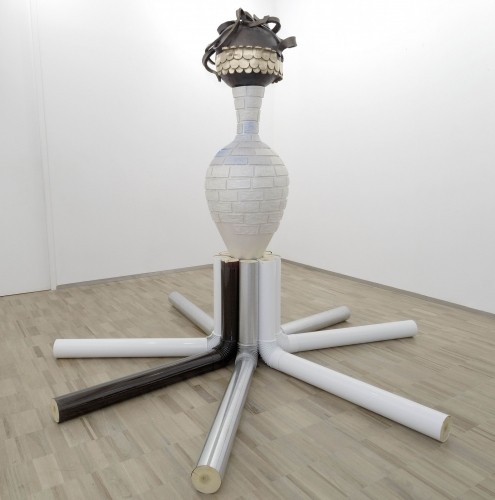Bernhard Martin
03 May - 28 Jun 2008

Bernhard Martin
Vielleicht Römisch, 2005
Bronze-party polished, hand-painted Stovepipe, tranches du bois
150 x 300 x 50 cm
Vielleicht Römisch, 2005
Bronze-party polished, hand-painted Stovepipe, tranches du bois
150 x 300 x 50 cm
BERNHARD MARTIN
03 May to 28 June 2008
Opening Reception: Friday, 02 May 2008, 6 to 9 p.m.
As its contribution to this year’s Gallery Weekend Berlin (May 2 to May 4), Galerie Thomas Schulte will open two parallel exhibitions, the first showing new, large format works by New York artist Jonathan Lasker, and the second presenting two sculptural installations by Bernhard Martin. This is Jonathan Lasker’s second major individual exhibition with Galerie Thomas Schulte; for Bernhard Martin it will be his first solo show at the gallery.
Bernhard Martin (born in 1966 in Hanover, lives and works in Berlin) is one of the few artists who treats painting and installation on fully equal terms. The link here is drawing. With the routine of a diary keeper, Martin completes a drawing each day in which one or the other standard sizes of DIN A3 or A4, usually in colorful watercolors and titled with the date. Even if he always approaches both as an independent discipline with its own feel, drawing and collage often serve as a sketch for later studio paintings or installations. Whether Martin uses the one medium or the other as the tested means of expression is less a conscious decision of the artist than natural delivery through the subject matter.
Without being political, Bernhard Martin reflects on philosophical questions and subjects like life and death, love and hate, history and fate, and treats both great social and cultural political issues as well as little human worries, from headaches to old age. For this he uses a poetic, highly imaginative, humorous and coded visual language that could derive either from the fairy tale world of the Brothers Grimm or from bizarre cartoons and the media. Always in search of complex visual solutions, Martin’s paintings, just as his installations and three-dimensional works, are large genre pieces that want to attest to the complexity of the world and underscore it in their often torn and overlapping forms of representation.
03 May to 28 June 2008
Opening Reception: Friday, 02 May 2008, 6 to 9 p.m.
As its contribution to this year’s Gallery Weekend Berlin (May 2 to May 4), Galerie Thomas Schulte will open two parallel exhibitions, the first showing new, large format works by New York artist Jonathan Lasker, and the second presenting two sculptural installations by Bernhard Martin. This is Jonathan Lasker’s second major individual exhibition with Galerie Thomas Schulte; for Bernhard Martin it will be his first solo show at the gallery.
Bernhard Martin (born in 1966 in Hanover, lives and works in Berlin) is one of the few artists who treats painting and installation on fully equal terms. The link here is drawing. With the routine of a diary keeper, Martin completes a drawing each day in which one or the other standard sizes of DIN A3 or A4, usually in colorful watercolors and titled with the date. Even if he always approaches both as an independent discipline with its own feel, drawing and collage often serve as a sketch for later studio paintings or installations. Whether Martin uses the one medium or the other as the tested means of expression is less a conscious decision of the artist than natural delivery through the subject matter.
Without being political, Bernhard Martin reflects on philosophical questions and subjects like life and death, love and hate, history and fate, and treats both great social and cultural political issues as well as little human worries, from headaches to old age. For this he uses a poetic, highly imaginative, humorous and coded visual language that could derive either from the fairy tale world of the Brothers Grimm or from bizarre cartoons and the media. Always in search of complex visual solutions, Martin’s paintings, just as his installations and three-dimensional works, are large genre pieces that want to attest to the complexity of the world and underscore it in their often torn and overlapping forms of representation.
